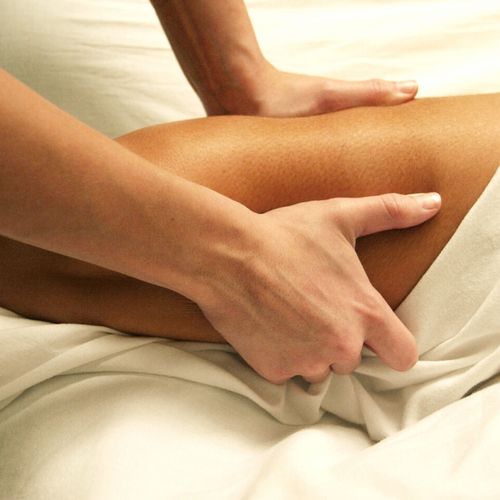In the evolving landscape of holistic health, Manual Lymphatic Drainage (MLD) has emerged as a beacon of hope and healing. This innovative therapy is reshaping patient care across a spectrum of health concerns, offering a gentle yet powerful approach to wellness that resonates with both practitioners and patients alike.
Understanding Manual Lymphatic Drainage
Manual Lymphatic Drainage is a specialized massage technique designed to stimulate and enhance the function of the lymphatic system. This intricate network of vessels and nodes plays a crucial role in our body's immune defense, fluid balance, and waste removal processes. Lymph fluid, which contains white blood cells and waste products, must circulate properly to maintain health. During an MLD session, a trained therapist uses light, rhythmic strokes to manipulate the skin, encouraging the movement of lymph fluid through the body and preventing fluid buildup that can cause swelling and discomfort.
The technique was developed in the 1930s by Danish physicians Emil and Estrid Vodder, who observed the impact of gentle massage on swollen lymph nodes. Since then, MLD has evolved into a sophisticated therapy backed by scientific research and clinical success. The gentle nature of MLD sets it apart from other massage techniques, making it suitable for a wide range of patients, including those with sensitive or compromised tissues.
Revolutionizing Cancer Care
For individuals navigating the challenging journey of cancer treatment, MLD offers a beacon of comfort and relief. The therapy's gentle approach provides a non-invasive method to address many of the side effects associated with cancer and its treatments, particularly pain and swelling.
The Cancer Research UK webpage on manual lymphatic drainage (MLD) offers detailed insights into the effectiveness and techniques of MLD in managing lymphedema, particularly for cancer patients. MLD involves gentle, rhythmic massage to stimulate the lymphatic system and reduce swelling. It discusses several methods, including Vodder, Földi, and Casley-Smith, each utilizing different hand movements and pressures to facilitate lymph drainage. The page underscores the importance of MLD in alleviating symptoms such as pain, heaviness, and skin changes, leading to an improved quality of life for patients. MLD can be an integral part of lymphedema management, helping to prevent complications and enhance overall well-being. Learn more about it here.
The Role of Manual Lymphatic Drainage in Lymphedema & Edema Management
Lymphedema, a chronic condition characterized by swelling in various parts of the body, particularly the limbs, has long been a challenge in medical care. MLD has proven to be a game-changer in managing this condition, offering relief and improved quality of life for many patients.
The article "Research Updates in Lymphatic Drainage" from the Massage Therapy Journal explores the benefits and latest research on manual lymphatic drainage (MLD). It highlights the effectiveness of MLD in reducing edema and lymphedema, with recent studies showing improvements in symptoms like swelling, pain, and range of motion. The article also discusses new findings on the timing and frequency of MLD sessions, and its potential benefits for conditions like axillary web syndrome and long-COVID related fatigue. For more details, visit the full article here.
Optimizing Surgical Recovery
The post-operative period is critical for healing and can significantly impact the overall success of surgical interventions. MLD has emerged as a powerful tool in enhancing recovery, particularly following plastic surgery and other procedures that may result in swelling and inflammation.
By gently stimulating the lymphatic system, MLD accelerates the removal of excess fluid and cellular debris from surgical sites. This process not only reduces visible swelling but also minimizes the risk of complications such as seromas and hematomas. Patients receiving MLD as part of their post-operative care often report faster recovery times, reduced pain, and improved satisfaction with their surgical outcomes.
Exploring the Cognitive Health Frontier
Recent advancements in neuroscience have unveiled an intriguing connection between the lymphatic system and brain health, opening new avenues for MLD in cognitive care. The discovery of the glymphatic system, a waste clearance pathway in the central nervous system, has sparked interest in lymphatic drainage's role in maintaining brain health and potentially combating neurodegenerative diseases.
A groundbreaking study demonstrated that enhancing lymphatic function in mouse models led to improved clearance of proteins associated with Alzheimer's disease. Enhancing lymphatic function could offer a novel approach to preserving cognitive function and combating age-related neurological diseases. These results open up promising avenues for future research and therapeutic strategies targeting the lymphatic system to improve brain health in the elderly. Explore the details of this groundbreaking research here.
Who Can Benefit from Manual Lymphatic Drainage
While we've discussed the benefits of MLD for cancer patients, post-surgical recovery, lipedema, and older adults, this therapy also supports a wide range of other conditions and symptoms:
Individuals with Chronic Venous Insufficiency: Alleviates swelling and discomfort in the legs.
Fibromyalgia and Rheumatoid Arthritis Patients: Eases chronic pain and stiffness.
People with Long-COVID: Mitigates fatigue and lingering swelling.
Those Experiencing Stress and Poor Sleep: Promotes relaxation and improves sleep quality.
Patients with Axillary Web Syndrome: Relieves pain and tightness, enhancing range of motion.
Enhancing Overall Wellness
The holistic benefits of MLD reach far beyond its targeted therapeutic applications, contributing to overall well-being in numerous ways. Regular MLD sessions have been associated with reduced stress levels, improved sleep quality, and enhanced immune function. These benefits stem from the therapy's ability to promote relaxation, improve circulation, and support the body's natural detoxification processes.
Many patients report feeling a sense of lightness and renewed energy following MLD treatments. This effect is attributed to the therapy's role in reducing fluid retention and promoting better nutrient delivery to tissues throughout the body. The cumulative effects of regular MLD contribute to a more balanced and resilient body, addressing not just symptoms but the overall health of the individual.
Embracing MLD for Optimal Health
As we continue to uncover the far-reaching benefits of Manual Lymphatic Drainage, its role in holistic healthcare becomes increasingly vital. From managing chronic conditions like lymphedema to enhancing post-operative recovery and exploring potential cognitive benefits, MLD offers a versatile and effective approach to health and healing.
Incorporating MLD into your wellness routine represents a proactive step towards optimizing your body's natural functions and enhancing overall health. Whether you're addressing specific health concerns or simply seeking to maintain wellness, MLD provides a gentle, non-invasive way to support your body's innate healing capabilities.
As research in this field progresses, particularly in areas like brain health and cognitive function, the potential of MLD to revolutionize holistic healthcare becomes ever more apparent. By embracing this therapy, you're investing in a comprehensive approach to health that supports your body's balance and vitality. Remember to consult with a qualified practitioner to develop a tailored approach that meets your individual needs and health goals, and discover the transformative power of Manual Lymphatic Drainage for yourself.










